Here’s a question from Mommy Denise.
Q: Hi teacher Tanya! I’m a first-time mom, stay-at home and my son is 13 months. Sometimes, I feel guilty when I’m playing with him, my mind is on my to-do tasks for the day. On the other hand, I somehow feel guilty too when I’m doing household chores and I just leave him there on his play area. It’s just difficult to be with my toddler 24/7 because I too would have to attend to other tasks at home. I’m not sure how long should I really be spending time with him and what should I be doing while I’m with him? Help!
A: Thanks for your honesty. I’ve been asked this question several times through email or during my parenting seminars. This is also the same concern of other moms out there, and my challenge too when I was raising two very young children. So, relax, it’s a valid concern.:)
First, I don’t think there is a mom who can literally be with his toddler every second of the day. Moms have to attend to themselves too- have a bathroom break, eat lunch, cook, make important calls, etc. That’s how life is. I can just imagine the challenge when it’s just you doing everything on your own, without an extra hand- may it be your spouse, a kasambahay or your relative, to assist you in the care of your child.
How will you manage your day when you have this assumption that you need to always “stimulate” your toddler?
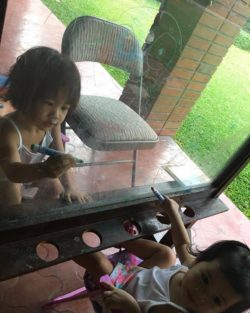
Second, have you asked yourself what will your toddler feel if you are always “hovering” over him? Commenting while he’s playing silently on his own? It’s not just tiring for you as a parent, but it can also get a bit stressful for your child, too. Do you know that your child also needs the time and space to be alone? Do you know that your child can play beautifully on his own, for long periods of time, if only we let them?
Magda Gerber, the pioneer of the RIE ® approach, believes that respect should be the basis of how we treat every child because it is through respecting a child’s ability and timing that a child will feel secure, competent and independent. In the RIE ®approach, babies and toddlers are given plenty of uninterrupted time for play. Do you know that babies can learn to play or explore on her own in a safe environment from an early age? Do you know know that a child learns competence and develops self-confidence when he plays on his own?
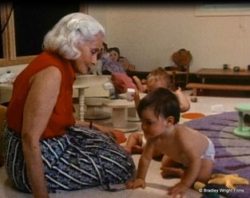
Magda Gerber, facilitating a RIE parent infant guidance class
Your daily routine should include these two principles according to Magda Gerber, and these are: 1) “Wants something time“- refers to all your caregiving routines (feeding, bathing, sleeping, etc), which enables every parent to not only care for his child but to also educate him. This is when your child literally wants something from you- he wants nourishment, he wants your hug, your presence, your touch. On the other hand, 2) “Wants nothing time” is when according to Magda, “you enter your child’s world rather than expecting her to enter yours”. You are simply available to your child without demanding anything from her or projecting any demands on her. This is where you let your child play naturally on his own, you give your child the time for uninterrupted play, in short, you support child-led play. This is where you simply observe more and do Less.
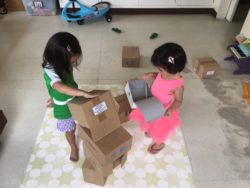
When you observe and do less, you don’t have to interrupt their play
I honestly find this practice quite challenging as it’s so easy to say something about what your child is accomplishing rather than simply “enjoy what he is doing” by observing him. We need to avoid having a “circus atmosphere” where our child is conditioned to constantly being entertained. In Magda’s words, “you can respect your child and yourself and make life easier by not teaching your child to play or showing her how to play with it.”
How do you make this possible? Start by being with your child but try not to influence what he does during playtime. Your goal is for your child to be the initiator of play and for it to be her experience. If we take over and get too involved, he might either lose his sense of exploration or be fully distracted.
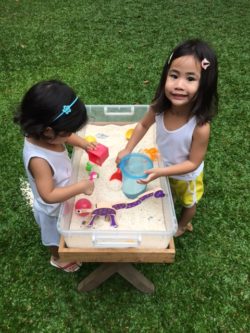
How long should I give him time for play? I believe as long as your child is involved in his free play, then let him be. If he wants your reassurance, or your presence, then be involved in his play. Aim for a balance between your child’s own time for play and your playtime with him.
When it gets challenging for me to relax and to observe my child, I find myself remembering the many benefits that unstructured play can do for my child.
What are the benefits of enabling your child to play naturally? There are numerous benefits to your child’s cognitive development and moreover, to your child’s emotional development.
- A study done by David Caruso (Young Children, 1988), revealed that importance of “infants’ spontaneous play in relation to cognitive growth as measured by later IQ tests”. When the babies were tested later, the babies who were enabled to play freely had higher IQ scores.
2. Research also points out that when children are given open-ended play time, they become more creative, better at language, better at problem-solving, less stressed, better at memory and more socially skilled.
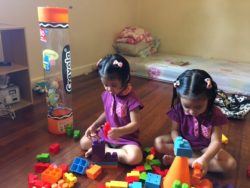
Ellie and Julia can play for a very long time on their own.
3. Your child develops the patience and the tolerance for frustration in figuring out how to put together or apart his play objects. The actual “process” of enabling him to do it by himself is indeed very important to his emotional development because this calls for competence and confidence-building. Magda wrote, “it builds your child’s trust in her ability to solve her own problems”.
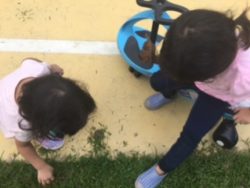
Outdoor play supports a child’s need for exploration
A nationwide study done in 2017 by Melissa & Doug in partnership with Gallup of parents of children between the ages of birth to 10 revealed that despite the abundance of the benefits of child-led, independent indoor play, it still ranks near the bottom of their priority list. The study also showed that parents say that their children are spending more time on screen-based activities (watching media and playing on electronic devices) than in unstructured play even if these are the parents’ least preferred choice. Further, parents may feel compelled to structure and fill their children’s time. One in 5 strongly agree that it’s good for kids to be bored now and then, and when asked about their strategy, one third of parents say that their approach is to let the child figure things out for themselves.
This study shows that our role as parents is crucial in supporting our child’s play. If we are indeed convinced with the many benefits that child-led play can do for our child’s holistic and total development, then we should think twice about how we really spend quality time with our child. If we really want to respect our child, then we should be able to support his freedom to discover the world on his own.

Spending quality time with your toddler means not just being physically present but according to Erica Komisar (2017), “presence requires being physically and emotionally available to your child“. When you support your child’s need for uninterrupted play, you get to support what gives your child- joy. And through play, you get to observe him more, and by observing him more, you “learn what his needs are and what will best support his developing sense of self and internal emotional security” (p.24).

So in summary, you need to give your child time to play on his own, and by doing so, you are able to “nourish yourself” as a parent because you are able to cater to your own needs and your own tasks. I believe that a parent who is able to nourish herself has so much to give to her child in return.
Let me end with what Magda would always say to parents that is very applicable when your child is playing, “a good strategy is to let your child figure out what to do. Life consists of ongoing problems and learning how to respond to them.” I believe that by spending “quality time” with your child by supporting his freedom to play, you are building the foundational skills that your child needs later on in life.
References:
Gerber, M. & Johson, A. (1998). Your Self-Confident Baby: How to encourage your child’s natural abilities from the Very Start. New York: John Wiley & Sons, Inc.
Komisar, E. (2017). Being There: Why Prioritizing Motherhood in the First Three Years Matters. New York: Random House LLC.
Research done by Gallup for Melissa & Doug entitled: Time to Play: A Study on Children’s Free Time: How It is Spent, Prioritized and Valued. (2017).

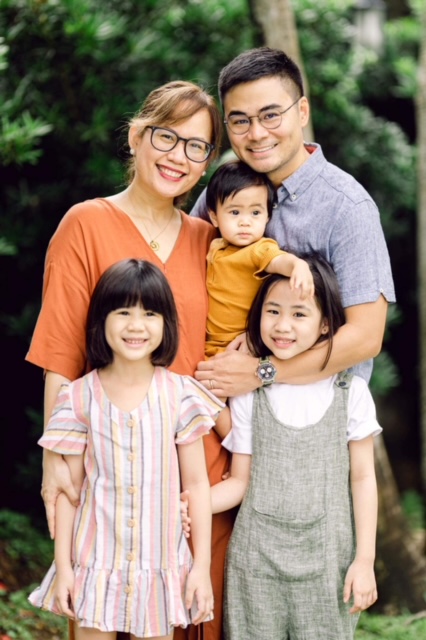
Comments are closed here.